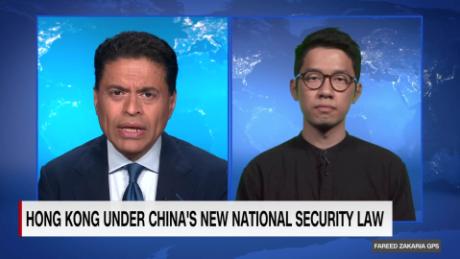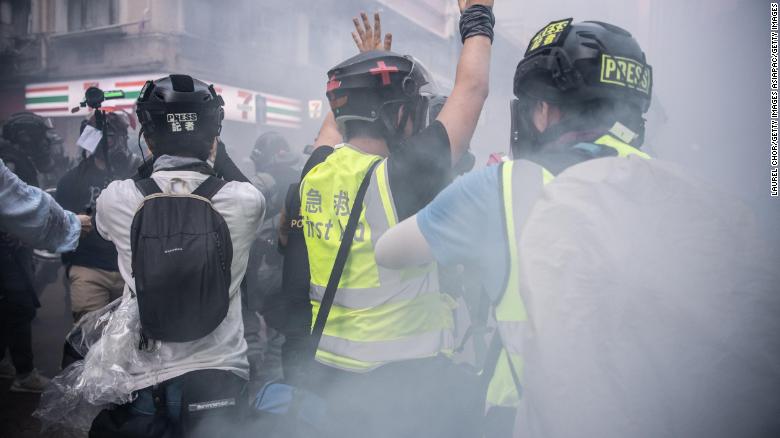香港(美国有线电视新闻网商业频道)由于中国对香港实施新的安全法,《纽约时报》正把一些工作人员调离香港,这既是外国媒体,也是本地媒体面对亚洲金融中心日益增加的不确定性。
《泰晤士报》报道称,香港员工“在获得工作许可方面面临挑战”周二报道在一篇详细介绍将部分员工调往韩国首尔的决定的文章中。“随着这座城市在中国的严格统治下面临一个新时代,《纽约时报》的编辑们决定,他们需要在该地区增加一个运营基地。”
此举被宣布为香港失去了与美国的特殊贸易地位之后,华盛顿认为,由于新的安全法,这座城市不再完全独立于中国。
《泰晤士报》宣布将把其亚洲数字新闻业务(约三分之一的员工在香港)转移到首尔,称安全法意味着“制定应急计划并开始在该地区分散我们的编辑人员是谨慎的。”
新立法于7月1日生效,将分裂、颠覆、恐怖主义和与外国势力勾结定为犯罪。官员们此前表示,这将影响极少数香港人,而批评者则指出,其广泛的范围和定义不清的违法行为令人担忧。
一位知情人士表示,尽管有关《纽约时报》行动的内部电子邮件公告是在一夜之间发出的,但香港《纽约时报》的一些员工在周三上午得知了这一情况,因为这一决定的消息在管理人员能够处理之前就已在推特上广为传播。
香港对言论自由有很强的保护,毗邻mainland China,签证政策宽松,长期以来一直是亚洲主要的媒体中心。包括美国有线电视新闻网、彭博社、法新社、金融时报和华尔街日报在内的多家媒体都在该市开展区域业务。

全球定位系统:香港能经受住北京的镇压吗?05:49
越来越冷
新的安全法引起了香港媒体界的焦虑,因为它涵盖了新的违法行为关于加强对该市记者的“监督和监管”的不明确建议。
该法第4条规定,“言论、新闻、出版、结社、集会、游行和示威的自由”将受到保护。但它也将泄露“国家机密”定为刑事犯罪。在中国,“国家机密”是一个模糊的术语,通常用于涵盖一系列被认为符合国家利益的问题,过去曾被用来监禁内地的记者。这可能会阻止记者和消息来源报道或合作报道与政府事务有关的报道。
官员们否认该法律含糊不清,并指出其中概述的保护措施。在回答该市外国记者俱乐部的问题时本月初至于政府能否保证新闻自由,香港领导人林郑月娥说:“如果香港记者可以向我百分之百保证,他们不会触犯这项全国性法律,我也可以这样做。”
在该法颁布后不久的新闻发布会上,当被美国有线电视新闻网(CNN)问及新闻自由时,林表示,人们可以自由批评该法,包括记者。但是,她警告说,“如果有更多,如果你参与组织或勾结,那是另一回事。这是一个证据和法律的问题。”
许多记者特别担心的是,这部法律中概述的管理媒体的新执法委员会将如何运作,以及更大的“监督”是否意味着创建中国式的新闻签证。此类签证受到严格监管,很难获得。政府过去也拒绝延长一些驻mainland China记者的工作许可,实际上是强迫他们离开这个国家。
知情人士称,包括《泰晤士报》在内的该市多家媒体机构在获得新签证方面遭遇延误。目前还不清楚这是新法律的结果,还是由于其他情况,如持续的冠状病毒大流行。
没有其他主要的外国新闻机构像《纽约时报》那样准备将一些业务转移到纽约以外的地方,但许多媒体的员工和管理人员正在进行对话。
《华尔街日报》的多名员工表示,管理人员已经在与员工初步协商,如果他们不得不搬到未来,他们对香港以外城市的潜在偏好,但目前没有这样做的计划。一位消息人士称,法国政府资助的新闻机构法新社(AFP)也在调查自己的立场,该机构在该市拥有主要业务。
当被问及美国有线电视新闻网的立场时,一位发言人表示,“目前没有从香港迁走的计划。”
他们补充道:“如果我们在那里的运营能力受到影响,我们当然会重新考虑。”
许多机构都不愿离开香港,因为香港与中国和亚洲其他地区都有着强大的交通联系,而且税收较低。尽管新加坡被包括英国广播公司在内的一些媒体用作运营基地,但它在新闻自由方面也有自己不尽如人意的记录。其他地区的首都,比如东京,运营成本要高得多,员工很难获得签证。
NYT方面表示,它“考虑了曼谷、首尔、新加坡和东京”,最终“除其他原因外,韩国证明了自己的吸引力,因为它对外国企业友好、拥有独立媒体,并在几个主要亚洲新闻故事中发挥了核心作用。”

2019年10月1日,在香港,警察发射催泪弹后,一名记者举起手。根据新的安全法,该市记者面临的压力越来越大。
尽管新的安全法可能会导致国际媒体离开香港或缩减在香港的业务,但当地媒体的处境要糟糕得多。
在其年度报告关于香港的新闻自由,香港记者协会在上周发布的一份报告中警告说,根据法律规定,“本已有限的言论自由、出版自由和新闻自由的空间将被严重缩小”。
HKJA主席杨宇春(Chris Yeung)表示:“过去,很多记者因报道或发表文章而在mainland China违反国家安全法而被监禁。”
该报告发现,甚至在该法颁布之前,香港的新闻自由就已经“降至历史最低水平”,此前,去年发生了持续且经常是暴力的反政府抗议活动,还发生了多起涉及记者和警方的事件。
该协会表示:“这是自2013年开展调查以来降幅最大的一次。”"公众和记者都对记者在报道新闻时受到的人身安全威胁表示担忧。"
对安全法的担忧不仅限于报道抗议活动或支持香港独立的人士。特别是,与“国家机密”相关的新罪名引起了人们的警觉,因为过去中国广泛采用这些罪名来压制对腐败和政府不当行为的报道。
香港一家知名媒体的一名调查记者表示:“问题在于,什么是‘国家机密’或情报,目前还没有界定,但最终将由(香港)行政长官决定。”“当所谓的‘红线’或操作空间不明确时,对媒体的损害更大,因此新闻编辑和记者将进行自我审查,因为他们担心一旦政府决定这样做,会触犯法律。”
这位要求匿名的记者补充道:“调查性报道的本质是揭露政府、政府官员或其他当权者的不当行为。”我们制作的报道往往不利于政府的立场,它们往往会破坏现状,引起公众的强烈关注、审查或“仇恨”,最后一种行为是违法的。”
Hong Kong (CNN Business)The New York Times is moving some staff out of Hong Kong due to a new security law imposed by China on the city, as both foreign and local mediaface increased uncertainty in the Asian financial hub.
Some Times employees in Hong Kong "have faced challenges securing work permits," the paperreported Tuesdayin an article detailing the decision to move some staff to Seoul, South Korea. "With the city facing a new era under tightened Chinese rule, Times editors determined they needed an additional base of operations in the region."
The move was announced as Hong Konglost its special trading status with the United States, after Washington deemed the city to be no longer sufficiently autonomous from China due to the new security law.
In announcing that it would move its Asia digital news operation — roughly one third of its staff in Hong Kong — to Seoul, the Times said the security law meant it was "prudent to make contingency plans and begin to diversify our editing staff around the region."
The new legislation, which came into force on July 1, criminalizes secession, subversion, terrorism, and collusion with foreign forces. Officials previously said it will affect a tiny handful of Hong Kongers, while critics pointed to its broad scope and ill-defined offenses as reason for alarm.
While an internal email announcement regarding the Times move was sent out overnight, some staff at the paper in Hong Kong learned about the situation on Wednesday morning as news of the decision was widely shared on Twitter, before managers were able to address them, a source with knowledge of the announcement said.
With strong protections for free speech, close proximity to mainland China, and generous visa policies, Hong Kong has long been a major media hub in Asia. Multiple outlets base their regional operations in the city, including CNN, Bloomberg, Agence France-Presse (AFP), the Financial Times and the Wall Street Journal.

On GPS: Can Hong Kong survive Beijing's crackdown?05:49
Growing chill
The new security law has led to anxiety within the Hong Kong media community, owing to its sweeping new offenses andundefined proposals for greater "supervision and regulation" of journalists in the city.
Article 4 of the law says "the freedoms of speech, of the press, of publication, of association, of assembly, of procession and of demonstration" will be protected. But it also criminalizes the leaking of "state secrets," a vague term commonly used in China to cover a range of issues deemed to be in the national interest and which has been used in the past to imprison journalists on the mainland. That could deter both journalists and sources from reporting or collaborating on stories relating to government affairs.
Officials have denied that the law is vague and pointed to the protections outlined in it. In response to a question from the city's Foreign Correspondent's Clubearlier this monthabout whether the government could guarantee press freedom, Hong Kong leader Carrie Lam said that if "reporters in Hong Kong can give me a 100% guarantee that they will not commit any offenses under this piece of national legislation, then I can do the same."
Asked about press freedoms by CNN in a press conference on the law shortly after it was enacted, Lam said that people would be free to criticize it, including reporters. But, she warned, "If there is more, if you are involved in organizing or colluding that's another matter. It's a question of evidence and the law."
Of particular concern for many reporters is how a new enforcement committee outlined in the law for managing the media will operate, and whether greater "supervision" will mean the creation of China-style journalism visas. Such visas come with strict oversight and can be hard to acquire. The government has also in the past refused to renew work permits for some journalists based in mainland China, effectively forcing them out of the country.
Multiple media organizations in the city, including the Times, are experiencing delays in getting new visas, sources with knowledge of the situation said. It is unclear whether this is as a result of the new law, or due to other circumstances such as the continuing coronavirus pandemic.
No other major foreign news organizations have yet to go as far as the Times in preparing to move some operations out of the city, but conversations are ongoing among staff and managers at many outlets.
Multiple employees at the Wall Street Journal said managers had been in preliminary consultations with staff about potential preferences for cities outside of Hong Kong, should they have to move into the future, but there were no immediate plans to do so. AFP, a French government-funded press agency with major operations in the city, is also examining its position, a source said.
Asked about CNN's position, a spokesperson said there are "no plans to relocate from Hong Kong at this time."
"If our ability to operate there becomes compromised we will of course review that," they added.
Many organizations will be loathe to leave Hong Kong, with its strong transport connections both to China and the rest of Asia and low taxes. While Singapore is used as a base of operations by some outlets, including the BBC, it has its own less-than-perfect record on press freedom. Other regional capitals, such a Tokyo, are far more expensive to operate in, and can be difficult to attain visas for staff.
The NYT said that it "considered Bangkok, Seoul, Singapore and Tokyo" and that ultimately "South Korea proved attractive, among other reasons, for its friendliness to foreign business, independent press, and its central role in several major Asian news stories."

A journalist raises his hands after police fire tear gas on October 1, 2019 in Hong Kong. Pressure has been growing on reporters in the city under a new security law.
Self-censorship
While the new security law may result in international media leaving the city or shrinking their operations in Hong Kong, the situation is far more dire for the local press.
In itsannual reporton press freedom in the city, published last week, the Hong Kong Journalists Association warned that "the already-limited room for free speech, freedom of publication and freedom of the press will be severely shrunk" under the law.
"In the past, a lot of journalists have been jailed for breaching national security law in mainland China because of their reporting or articles," HKJA chairperson Chris Yeung said.
The report found that even before the law was enacted, Hong Kong press freedom had "dropped to a record low," in the wake of sustained and often violent anti-government protests last year and multiple incidents involving reporters and the police.
"The decline is the sharpest since the survey was launched in 2013," the association said. "Both the public and reporters expressed concern over the threatened personal safety of reporters when covering news."
Concerns about the security law go beyond reporting on protests or proponents Hong Kong independence. In particular, new offenses relating to "state secrets" raised alarm because of the broad way they have been applied in China in the past to stifle reporting on corruption and government misbehavior.
"The problem is that what constitutes 'state secret' or intelligence is not defined, but are to be ultimately decided by (Hong Kong's) Chief Executive," said an investigative reporter with a prominent Hong Kong outlet. "The damage to the press is greater when the so called 'red line' or the operating space are not explicit, so news editors and reporters will self censor, for fear of treading onto what would become illegal, when the government decides so."
The reporter, who requested anonymity to talk freely about the law, added that "the essence of investigative reporting is to reveal wrongdoing committed by the government, its officials or others in positions of power. More often than not, the stories we produce are unfavorable to the government's position, they often would disrupt the status quo, and lead to intense public attention, scrutiny, or 'hatred,' the last of which is an offense under the law."






